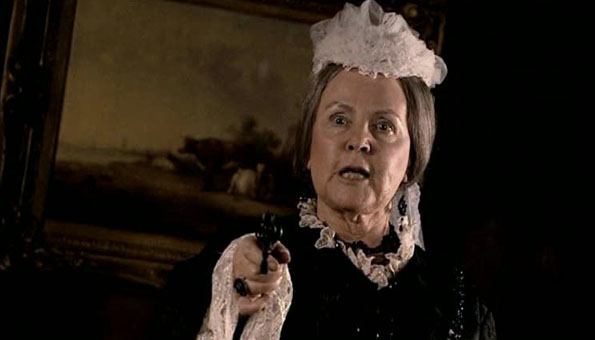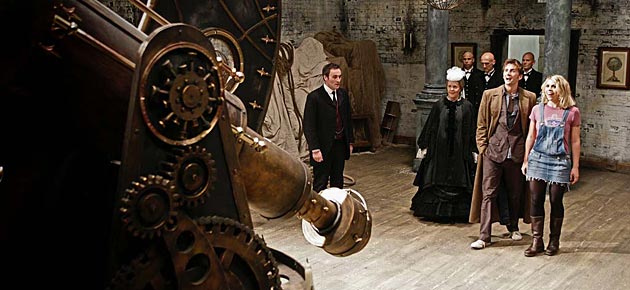STORY 173: TOOTH & CLAW
It's another history trip for The Doctor (David Tennant) and his Companion Rose Tyler (Billie Piper). Oddly, while we are back to where we were the last time we encountered the Victorian Age, we have a few difference in Tooth & Claw which almost make us forget we've been this way before in The Unquiet Dead. One: we arrive in Scotland rather than Wales. Two: the Victorian we meet is not Charles Dickens, but the Big Cheese herself. Ladies and Gentlemen, Her Majesty Queen Victoria, Empress of India. We get some monks, some werewolves, and some points of logic not addressed.
A group of monks arrive at a grand house. They declare they wish to take the estate, and are natrually refused. With that, they go all kung-fu Avatar: The Last Airbender on them and take it by force. Meanwhile, the Doctor lands in what he thinks is 1979 (Vietnam, Margaret Thatcher, punk), but it really 1879. We are near Balmoral, and the Doctor and Rose encounter Queen Victoria (Pauline Collins). She has been diverted from her train and now must travel by carriage. Where do they all end up in?
The owner of the estate, Sir Robert MacLeish (Derreck Riddel), has been coerced into helping these meddlesome monks to help with their nefarious scheme. We quickly learn about the legend of a werewolf in these Scottish Highlands, and what the monks want: the throne and its occupant itself. As is the case in Doctor Who, the Doctor and the Companion are split: Rose finds herself trapped with Lady Isobel (Michelle Duncan) and the staff (talk about Upstairs, Downstairs), while the Doctor is with Her Majesty, Sir Robert, and the Queen's guard, Captain Reynolds (James Sives). The actual werewolf, kept within the cellar, is unleashed. However, while the Doctor and Sir Robert go after the wolf, Her Majesty is more than capable of looking after herself.
 |
Allow me to stop here to wonder what exactly writer Russell T Davies' obsession with wolves is. Wasn't all last season about Bad Wolf, and now we get another wolf-based story? Just a thought.
Of course, it isn't just Her Majesty that must be protected, but what she carries. It is a very special object: the Kor-I-Noor Diamond, which Victoria's late husband Prince Albert had continously cut down. The Doctor now realizes that all this was not a trap to ensnare Victoria, but really a trap within a trap: it was to capture the werewolf. It's off again to Sir Robert's late father's laboratory in the attic.
Sir Robert atones for his treason by sacrificing himself to the werewolf to gain time for the Doctor. That telescope he at first dismissed he now realizes was really a way of magnifying moonlight, and with that and the Kor-I-Noor, the werewolf is stopped and destroyed at the monster's request.
The Queen does not leave uninjured: she gains a mysterious scratch (the Doctor believing it came from the wolf, Her Majesty insisting it was a splinter from the door when the wolf broke in). Victoria knights Sir Doctor of the Tardis and Dame Rose of Powell Estates, but then banishes them because, among other things, she is not amused. However, after the chaos of the night previous (and after some speculation from the Doctor and Rose that the current House of Windsor are all werewolves--poor Catherine, Duchess of Cambridge so unaware...), Her Majesty decides to create a new institute to prepare and study extraterrestrial menaces, and names it after the home where all this took place...
TORCHWOOD.
If we go by the thought that Tooth & Claw was nothing more than a way to set up a Torchwood spin-off, then we would declare it a failure. Fortunately, while I think Tooth & Claw was created in part to set up this mythology surrounding the Torchwood Institute and/or Captain Jack Harkness from Series One, I also think it was Davies' efforts to tell a good gothic story. For the most part, it works.
One has to compliment Collins' Queen Victoria. She isn't the dour, grim, dare I say, 'Victorian' person she could have been played as. Instead, Collins plays her as an enthusiastic follower of ghost stories, at one point telling Sir Robert, "Tell us of monsters," with girlish but royally restraint glee. Collins makes a return to Doctor Who, having been Samantha in the Second Doctor story The Faceless Ones, and if one compares her performances both in The Faceless Ones (what we have that exists) and Tooth & Claw we see Collins to be an actress of great range and talent.
In a sadly smaller role, Riddell's Sir Robert was excellent as the conflicted but ultimately noble man. It's a sad thing in Doctor Who: there is a penchant for killing off good, even great characters (Sir Robert, Sara Kingdom in The Daleks' Master Plan, Lynda in Bad Wolf Parts 1 & 2, Rita in The God Complex) but not only keeping absolutely lousy/useless characters alive but worse, making them COMPANIONS (Katarina, Adric, Rory "Pond", and the nadir of horrible characters, River Song)! Yes, both Katarina and Adric were killed (there is debate as to whether Rory or River have "technically" been killed) but while Sara, Lynda, definitely Rita and maybe Sir Robert would all have made better Companions, I can say that Riddell's performance was quite good.
My issues with Tooth & Claw are less with the performances than they are with the points of logic in the story. How did Sir Robert's father and Prince Albert know that the werewolf would eventually strike at the Queen at Torchwood? How did they both know to have Her Majesty helpfully bring along the Kor-I-Noor with her (given that the diamond did not come to the Queen's possession until 1850, a mere twenty-nines years before the events in Tooth & Claw)?
I digress to say that the actual diamond used in Tooth & Claw looked quite fake and again, slightly historically inaccurate: it wasn't just this big rock laying about but located in a brooch Her Majesty wore. Yes, little technicalities, but still...
Albert died in 1861. I just wondered why Queen Victoria, still in mourning for her beloved Albert, would continue cutting the Kor-I-Noor down almost twenty years later.
The biggest point of logic in Tooth & Claw comes from the hemophilia angle. The story strongly suggests that Victoria later become a werewolf because in 1879 (when she was sixty years old) because of a scratch she receieved from the werewolf.
Allow me another digression; at this point all I can hear is Monty Python & The Holy Grail: "it's just a scratch".
This, the Doctor theorizes, is how hemophilia spread among the various royal houses of Europe after Victoria & Albert's progeny married into them. HOWEVER, if we go by that, wouldn't it stand to reason that they were infected by bites from this 60-year-old broad running all over Europe taking bites out of her own children and not by blood line due to their birth mother?
I don't buy that bit of logic that the hemophilia spread around the Houses of Bourbon, Hohenzollern or Romanov were a result of an old lady crossing the English Channel to howl at her descendants. Furthermore, having watched and rewatched Tooth & Claw (even going so far as to go into slow motion), I saw no visual proof that the wolf actually laid a claw on Her Majesty, bringing the entire premise of the hemophilia angle down.
Finally, the entire subplot of getting Queen Victoria to say "We are not amused" was becoming tiresome and silly. Moreover, there is no actual proof that Her Majesty actually said, "we are not amused." The story I had heard was that she had seen a parody of herself and replied with royal understatement her displeasure. However, there is nothing recorded that proves she actually uttered those immortal (and given some future Doctor Who stories from later in this season, amazing precient) words. Given all the mayhem and chaos erupting in one night, all the focus on "we are not amused" was wasting time.
I digress to wonder why, just after seeing Sir Richard devoured by the werewolf, Rose would have the wits to get a badly shaken Queen Empress to say such a silly phrase in order to win a bet.
A few other things that bring Tooth & Claw down at the second viewing. While Euros Lyn should be congratulated for keeping the pace brisk I thought there were a tad too many point-of-view shots from the werewolf's perspective. I wondered where all the monks went after the wolf was defeated (and defeated in a way that didn't strike me as good--clever perhaps but also perhaps a bit too easy), and the entire Matrix-like opening made me wonder exactly where these Brethren of the Wolf were from (Britain or Japan). There was a suggestion that these monks had turned from worship of God to that of the Wolf, but no real time for a follow-up.
Again, I wonder if having the old standard of four-part half-hour stories a la classic Doctor Who would have allowed for greater exploration.
Ultimately, Russell T Davies crafted a good, but not great gothic horror story in Tooth & Claw. It had good elements of the spooky house and the werewolf as dangerous rather than hunky (wonder whatever I am referring to),
but Queen Victoria didn't have a large role in the story that one would imagine could have done more with her. I also did wonder about those points of logic that didn't make sense to me, and the idea that this is the genesis of the Captain Jack Cult and the Torchwood Fixation that I simply have been unable to get into also push Tooth & Claw down. Still, not a bad episode, but not among the greats...
| She was very much amused... |
Next Story: School Reunion


No comments:
Post a Comment
Views are welcome, but I ask that there be no foul language. Any comments with either vulgar words or that are bigoted in any way towards anyone based on sex, race, religion, or any other protected category will not be published. Keep it clean and keep it respectful. Thank you.